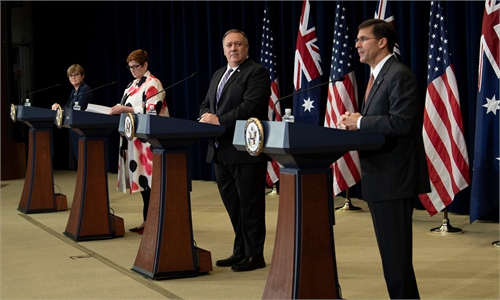
Illustration: Liu Rui/GT
Australia is moving one step closer to the edge of the cliff. On Thursday, Australia's newly appointed High Commissioner to India Barry O'Farrell indicated the federal government's support for India in its border disputes with China by saying "Australia opposes any attempts to unilaterally alter the status quo."
According to Australian media, Australia has not taken sides in the China-India border disputes since the 1960s, but diplomatic sources said Australia's Department of Foreign Affairs and Trade recently decided to clarify its public position.
It is worth noting what support Australia would offer to India, since it is India that altered the status quo that led to the recent Galwan Valley clashes between Indian and Chinese troops.
It is not surprising that Australia shows a supportive posture to India, especially at a time when China and India are cautiously mending their worsening ties due to the Galwan Valley conflict and when relations between China and Australia are at a historical low ebb. By wooing New Delhi, Canberra seeks to win "friends" to gain leverage in its tense relations with Beijing. From the perspective of values, India has always been the blue-eyed boy among Western countries. India is viewed as a democratic model among developing countries, and supporting India is a politically correct move made by Australia.
Moreover, Australia is anxiously waiting for the olive branch extended by India to take part in the trilateral Malabar naval exercise that comprises of the US, Japan and India. Earlier, it was reported that India is favorably considering Australia's interest in being part of the annual exercise, and a formal decision is likely to be taken in the next couple of weeks. If Australia joins, the exercise will become more of an occasion where all members of Quad flex their muscles to check China's influence in the region.
But the intimacy between Australia and India will not last long. Both are trying to strike a subtle balance between strong economic and trade relations with Beijing and reaffirmed political and security relations with Washington, and both are well aware that they are just one play among others in Washington's strategy to contain Beijing. Despite the common target, namely China, their own calculations of interests of Australia and India have contributed to the absence of meaningful cooperation between the two so far.
Australia sees both the Pacific and the Indian Ocean as where it can exert influence, while India views the Indian Ocean as its own. As the two countries ascend in the Indian Ocean, India exhibits some kind of discomfort with Australia's hegemonic ambition in the region. As both seek a dominant role, they may encounter clashes of interest in the Indian Ocean in the long run.
It surprised many when Australian Foreign Minister Marise Payne said in Washington on Tuesday, "The relationship we have with China is very important, and we have no intention of injuring it." Such a position has backfired again and again when Australia took its stance in the South China Sea, Huawei, Hong Kong, the coronavirus pandemic, and to date, the China-India border dispute. Perhaps Australia needs to show something concrete to prove that it is not a model of harming China's interests, which would cost itself dearly.

